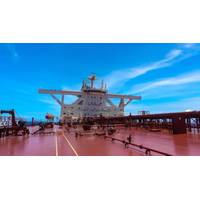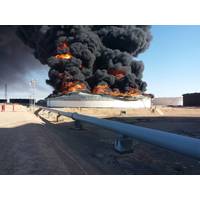Libya's NOC Warns of Dangers at Oil Ports

The chairman of Libya's National Oil Corp (NOC) on Saturday warned against the risk of a disaster at the country's oil ports due to a growing military presence with storage tanks held at capacity for months due to a blockade."Oil ports are closed, exporting is halted.
NOC Declares Force Majeure on Biggest Oilfield
Libya's National Oil Company (NOC) on Monday declared force majeure on exports from the El Sharara oilfield, which was seized at the weekend by a local militia group.NOC said the shutdown would result in a production loss of 315,000 barrels per day (bpd) at its biggest oilfield, and an additional loss of 73,000 bpd at the El Feel oilfield.Production…
Key Oil Export Terminals Reopen in Libya

Tripoli-based National Oil Corp (NOC) said on Wednesday four export terminals were being reopened after eastern factions handed over the ports, ending a standoff that had shut down most of Libya's oil output.Production and export operations would be restored "within the next few hours", an NOC statement said, although the restart at Es Sider and Ras Lanuf…
UN Resolution Targets Libyan Fuel Smugglers
The U.N. Security Council has extended sanctions on illegal oil exports from Libya to cover refined petroleum products as well, in a bid to stem rampant smuggling of subsidised fuel by sea. Imported fuel that is priced lower for the domestic market is commonly smuggled by ship from western Libya to Malta, Italy and Turkey, and by land to Tunisia, according to U.N.
Libya: Air Strikes Aimed to Regain Oil Ports
East Libyan forces carried out air strikes around major oil ports on Saturday as they sought to regain control of the area from a rival faction, a military spokesman said. The eastern-based Libyan National Army (LNA) and allied forces retreated on Friday from Es Sider and Ras Lanuf, two of Libya's largest export terminals, as a faction known as the Benghazi Defence Brigades (BDB) attacked.
Armed faction enters major Libyan oil port
An armed faction entered a major Libyan oil terminal and a nearby airport on Friday, after attacking forces that have controlled the terminals since September, officials and residents said. The terminals at Es Sider and Ras Lanuf are two of Libya's largest, with potential combined production capacity of about 600,000 barrels per day (bpd).
Reopened Libyan Ports Hope Foreign Staff Will Return
Ports still operating well below capacity; infrastructure damaged by conflict, neglect. Guards and officials at major ports in Libya's eastern Oil Crescent say they are hoping foreign workers will soon return as they struggle to build on output gains with meagre resources. The National Oil Corporation (NOC) reopened three ports in the curve of coastline south of Benghazi in September…
Tanker Docks at Libya's Es Sider Port to Load First Crude Cargo in Two Years
An oil tanker docked at the east Libyan port of Es Sider on Monday to load the first cargo of crude since the terminal reopened following a two-year closure, port officials said. Es Sider, Libya's biggest export terminal, had been shut due to a blockade by a military faction since 2014. It reopened in mid September, but repairs were needed before tankers could load at the port…
Libya Exports First Oil Cargo From Ras Lanuf Since 2014

An oil tanker left the Libyan port of Ras Lanuf for Italy early on Wednesday with the first crude export cargo from the terminal since at least late 2014, boosting hopes of reviving Libya's battered oil output. The port manager of Ras Lanuf said a second tanker was preparing to load at the terminal, one of four seized on Sept. 11-12 by eastern Libyan forces loyal to military leader Khalifa Haftar.
Libyan Commander's Seizure of Oil Ports Risks New Conflict
Libyan forces loyal to eastern commander Khalifa Haftar said on Monday they had tightened their control over four major oil ports, casting a Western-backed project to unite Libya and revive oil exports into deep uncertainty. Haftar's forces met little resistance as they seized the terminals at Ras Lanuf, Es Sider, Zueitina and Brega in an operation launched on Sunday…
Eastern Libyan Commander's Forces Seize Key Oil Ports
Oil port attacks risk sparking wider conflict; Libya crude output hovering around 200,000 bpd. Forces loyal to east Libyan commander Khalifa Haftar on Sunday seized at least two key oil ports from a rival force loyal to the U.N.-backed government, risking a new conflict over the OPEC nation's resources. Ahmed al-Mismari, a spokesman for Haftar's self-styled Libyan National Army (LNA)…
Libya's NOC Says Tanker Will Transfer Oil from Threatened Port
Libya's National Oil Corporation (NOC) said on Thursday that rival forces had agreed to let a tanker dock at Zueitina port to load oil and take it to a safe place. The NOC expressed concern earlier this month after reports of possible clashes between the Petroleum Facilities Guard (PFG) and forces loyal to eastern commander Khalifa Haftar.
Libya to Resume Oil Shipments from Hariga
Libya will resume oil shipments from the port of Marsa El Hariga after an agreement was reached at talks in Vienna between rival oil officials representing the east and west of the country, Libyan oil sources told Reuters. Exports from the port have been blocked since early this month due to a standoff between the rival eastern and western National Oil Corporations (NOC).
Blacklisted Tanker Returns to Libya's Zawiya Port
A tanker that Libya's rival eastern government had been using to try to export oil in defiance of the Western-backed administration in Tripoli returned to the country on Saturday, after it was blacklisted by the United Nations, the state oil company said. The eastern government's parallel oil company had hoped to sell the cargo of 650…
Libya's NOC Warns of More Islamic State Attacks
Fida oil field was attacked by militants last week - NOC. Libya's oil facilities are likely to suffer further attacks unless a United Nations-backed unity government is approved, the head of the National Oil Corporation (NOC) told Reuters in an interview on Monday. Mustafa Sanalla also said suspected Islamic State militants had staged their latest attack against Libya's oil infrastructure last Thursday or Friday…
Libya's NOC Talks with Tribal Elders on Closed Oilfields
Libya's state oil firm NOC is in talks with tribal elders to try to reopen oilfields closed by protests but no breakthrough has been achieved yet, a spokesman for the National Oil Corporation said on Monday. Major oilfields such as El Sharara and El Feel in western Libya have been blocked for months by security guards or tribesmen hostile to an internationally unrecognized government controlling the capital Tripoli.
Libya Negotiating for Two Refineries
Libya's official government is in talks with British Virgin Islands-based Pavilion Recovered Oil to build two small refineries, one in the east and the other in the south of the oil producer, it said on Tuesday. The refineries would each have a production capacity of 6,000 barrels per day (bpd), a government spokesman said. Premier Abdullah…
Libya Output Rising to 490,000 bpd
Libya's oil production has risen to around 490,000 barrels a day, an industry source said on Monday. The OPEC producer managed to restart the El-Feel and Wafa oilfields in western Libya while maintaining production at eastern fields. Force majeure has been declared at central fields due to attacks by militants. Reporting by Ulf Laessing
Libya's El Feel, Wafa Oilfields Working Normally
Libya's El Feel and Wafa oilfields are working normally despite power problems, state-run National Oil Corp (NOC) said on Thursday, as crude production in the west of the OPEC member country made a surprise comeback. Fields in western Libya such as El Feel and El Sharara shut in November when gunmen attacked the latter, in a continuation…
Libyan Government Forces Attack Tripoli Airport
War planes from Libya's internationally recognised government attacked the last functioning airport in Tripoli, the capital controlled by a rival administration, on Monday, officials said, the latest in a string of tit-for-tat strikes. Rival governments and parliaments are battling for control of the North African country and its oil resources four years after the ousting of Muammar Gaddafi.